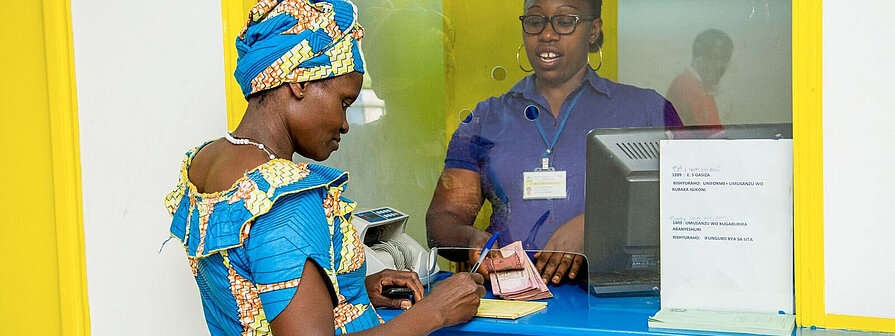German Sparkassenstiftung Eastern Africa in Rwanda
Our Eastern African headquarter is based in Kigali, Rwanda.
A portrait of Rwanda
Small and landlocked in the East Africa region, Rwanda is hilly and fertile, with a densely packed population that, as of 2025, is estimated at approximately 14.1 million people according to the National Institute of Statistics of Rwanda (NISR). As of 2024, approximately 27.4% of the population live in poverty, with 5.4% in extreme poverty as per EICV7 (Integrated Household Living Conditions Survey 7).
Rwanda now aspires to reach a Middle-Income Country (MIC) status by 2035 and a High-Income Country (HIC) status by 2050. This aspiration will be implemented through a series of five-year National Strategies for Transformation NST2 built on the lessons from the NST1 implementation and continues the drive towards Vision 2050. This was underpinned by detailed sectoral strategies that are aimed towards achieving the Sustainable Development Goals.
According to the finscope survey of 2024, financial inclusion in Rwanda has reached 96% (7.8 million) up from 93% in 2020, getting closer to the universal access of 100% set target. There has been huge growth in formal financial inclusion or formally served from 77% (5.4 million) in 2020 to 92% (7.5 million) in 2024 surpassing the set target of 90% by 2024. Uptake and use of other formal non-bank products and services have drastically increased to 92% (7.5 million) from 75% (5.3 million) in 2020 driven largely by mobile money. The proportion of banked individuals remained similar with a slight increase in absolute numbers (22%/1.6 million in 2020 vs 22%/1.8 million in 2024). While informal mechanisms or informally served continue to be relevant alternatives for adult Rwandans, there has been a decline to 72% (5.9 million) in 2024 from 78% (5.6 million) in 2020. Still 4% (316,000) of Rwandan adults are neither using formal nor informal financial products and or services (i.e. financially excluded).
The promotion of “Umurenge SACCOs” in 2010 led to a substantial increase of financial inclusion in these areas. 90% of the population has access to a U-SACCO within 5 km. However, financial literacy and the lack of qualified personnel in Microfinance Institutions (MFIs) and SACCOs is still a constraint to sustainable financial inclusion in Rwanda.
Our vision and activities
German Sparkassenstiftung opened an office in Kigali / Rwanda in 2008 and has since partnered with Rwandan ministries and various institutions such as MINECOFIN (Ministry of Finance and Economic Planning), MINICOM (Ministry of Trade and Industry), RCA (Rwanda Cooperatives Agency), RICEM (Rwanda Institute of Cooperatives, Entrepreneurship and Microfinance), ULK (Independent University of Rwanda) , AMIR (Association of Microfinance Institution of Rwanda) and NCCR (National Cooperative Confederation of Rwanda) under different projects of strengthening the microfinance sector through capacity building, vocational training, financial education, Business Games (MBG, SG, FBG and MCR), providing strategic support of a Microfinance Training Academy(RICEM), the restructuring of the Umurenge SACCO sector, the automation of U-SACCO and knowledge transfer, consolidation of 30 District-level SACCOs in a multi-merger process, and to establish a Cooperative Bank. These efforts continue to enhance financial inclusion and strengthen Rwanda’s microfinance landscape.


